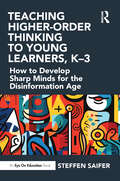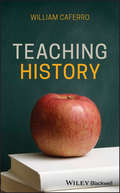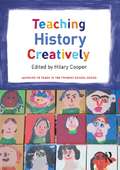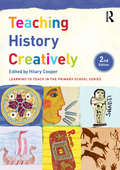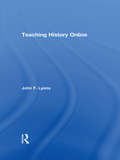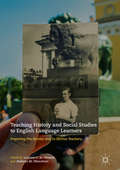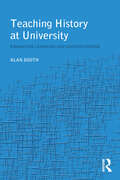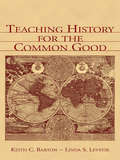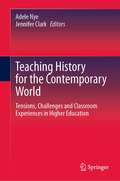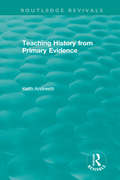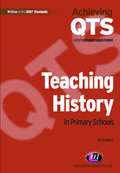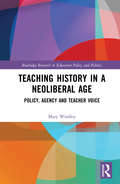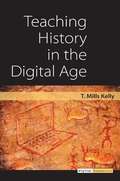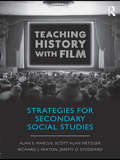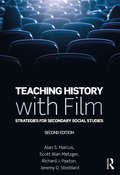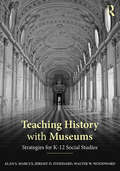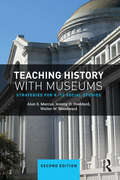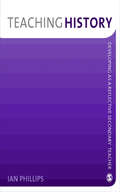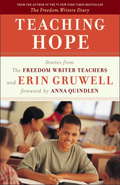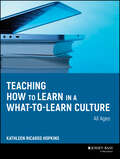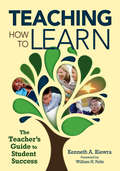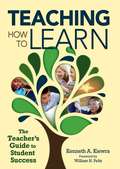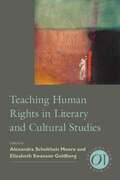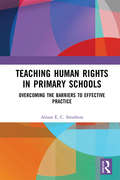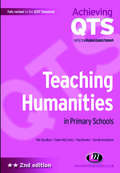- Table View
- List View
Teaching Higher-Order Thinking to Young Learners, K–3: How to Develop Sharp Minds for the Disinformation Age
by Steffen SaiferTo be truly educated today, students need more than knowledge; they need higher-order thinking skills. Critical and creative thinking is required to recognize and counter disinformation, to overcome thinking errors, and to be successful in school and life. To effectively teach these skills, we must start early, when young minds are still forming. While K–3 students are capable of higher-order thinking, most lessons engage only their lower-order thinking. In this comprehensive book based on sound science, Dr. Saifer offers many practical and engaging ways to develop students’ logical, critical, and creative thinking skills within nearly every lesson, in all subject areas, and throughout the day. Teaching Higher-Order Thinking to Young Learners, K–3: How to Develop Sharp Minds for the Disinformation Age is key reading for any early childhood teacher, leader, or parent.
Teaching History
by William CaferroA practical and engaging guide to the art of teaching history Well-grounded in scholarly literature and practical experience, Teaching History offers an instructors’ guide for developing and teaching classroom history. Written in the author’s engaging (and often humorous) style, the book discusses the challenges teachers encounter, explores effective teaching strategies, and offers insight for managing burgeoning technologies. William Caferro presents an assessment of the current debates on the study of history in a broad historical context and evaluates the changing role of the discipline in our increasingly globalized world. Teaching History reveals that the valuable skills of teaching are highly transferable. It stresses the importance of careful organization as well as the advantages of combining research agendas with teaching agendas. Inspired by the Scholarship of Teaching and Learning movement, the book encourages careful reflection on teaching methods and stresses the importance of applying various approaches to promote active learning. Drawing on the author’s experience as an instructor at the high school and university levels, Teaching History: Contains an authoritative and humorous look at the profession and the strategies and techniques of teaching history Incorporates a review of the current teaching practice in terms of previous methods, examining nineteenth and twentieth century debates and strategies Includes a discussion of the use of technology in the history classroom, from the advent of course management (Blackboard) systems to today’s digital resources Covers techniques for teaching the history of any nation not only American history Written for graduate and undergraduate students of history teaching and methods, historiography, history skills, and education, Teaching History is a comprehensive book that explores the strategies, challenges, and changes that have occurred in the profession.
Teaching History Creatively
by Hilary CooperFresh and innovative, Teaching History Creatively will foster creativity in both learners and practitioners alike. By introducing teachers to a wealth of available approaches to historical enquiry, this book ensures creative, active and effective learning which includes plenty of challenges, clear goals and opportunity for progression. Underpinned by theory and research, it offers informed and practical support, illustrated throughout by examples of children’s work. Key themes addressed include: how good history education and creativity are inseparable; investigating sources: archaeology, visits and time capsules; using archives in your own research project; historical agents and history detectives!; drama for exploring events, myths and legends; communicating historical understanding creatively. Written by experienced authors with extensive experience of history teaching in the primary school, Teaching History Creatively is an essential purchase for any professional who wishes to embed creative approaches to teaching in their classroom.
Teaching History Creatively (Learning To Teach In The Primary School Ser.)
by Hilary CooperThe fully updated second edition of Teaching History Creatively introduces teachers to the wealth of available approaches to historical enquiry, ensuring creative, effective learning. This book clearly sets out the processes of historical enquiry, demonstrating how these are integrally linked with key criteria of creativity and helps readers to employ those features of creativity in the classroom. Underpinned by theory and research, it offers informed and practical support and is illustrated throughout with examples of children’s work. Key themes addressed include: investigating sources using archives in your own research project becoming historical agents and history detectives drama for exploring events myths and legends communicating historical understanding creatively. With brand new chapters from the Stone Ages to the Iron Age, using prehistoric sources; The withdrawal of the Romans and the conquest and settlement of Britain by the Anglo-Saxons, in addition to many new case studies, this exciting edition puts an emphasis on accessible, recent research, new evidence and interpretations and encourages the creative dynamism of the study of history. Teaching History Creatively provides vivid and rich examples of the creative use of sources, of approaches to understanding chronology and concepts of time and of strategies to create interpretations. It is an essential purchase for any teacher or educator who wishes to embed creative approaches to teaching history in their classroom.
Teaching History Online
by John F. LyonsBringing history teaching into the twenty-first century, Teaching History Online is a concise guide to developing and using internet resources in history instruction. It offers practical, jargon-free advice to help the history teacher develop online assignments, and provides an informed introduction to the myriad resources and tools available for use in the online classroom. Beginning with a chapter on the benefits of teaching and studying online, John F. Lyons goes on to address instructors’ most commonly asked questions and concerns, including: designing an online class providing online alternatives to the lecture developing a user-friendly discussion board conducting assessment and dealing with classroom management issues. For historians interested in providing an online element to their traditional face-to-face classroom teaching, the final chapter shows how to develop successful hybrid/blended classes. An accessible introduction and valuable resource, Teaching History Online includes sample lesson plans, examples of online learning tools, and suggestions for further reading, helping those who use – or want to use – online resources to create exciting, interactive and rewarding learning environments. Visit the companion website, which includes extra reading and resources information at: www.routledge.com/textbooks/9780415482226.
Teaching History and Social Studies to English Language Learners
by Luciana C. de Oliveira Kathryn M. ObenchainThis book investigates the preparation of secondary history and social studies (SS) teachers to teach English language learners (ELLs) in twenty-first century classrooms. This edited collection focuses on the ways in which pre-service and in-service teachers have developed - or may develop - instructional effectiveness for working with ELLs in the secondary history and social studies classroom. The authors address a variety of standards and content examples, including the National Council for Social Studies C3 Framework and Curriculum Standards, the Common Core State Standards for English Language Arts, and content from history, geography, and civics. This volume is part of a set of four edited books focused on teaching the key content areas to English language learners.
Teaching History at University: Enhancing Learning and Understanding
by Alan BoothAlan Booth draws on a wide range of international research as well as the reflections and experiences of university historians, linking theory and practice. Teaching History at University examines how high-quality history teaching and learning can be achieved in today's universities worldwide. This is an essential resource for university teachers and all those who are responsible for ensuring the quality of teaching and learning policies and practices within their institutions.
Teaching History for the Common Good
by Keith C. Barton Linda S. LevstikIn Teaching History for the Common Good, Barton and Levstik present a clear overview of competing ideas among educators, historians, politicians, and the public about the nature and purpose of teaching history, and they evaluate these debates in light of current research on students' historical thinking. In many cases, disagreements about what should be taught to the nation's children and how it should be presented reflect fundamental differences that will not easily be resolved. A central premise of this book, though, is that systematic theory and research can play an important role in such debates by providing evidence of how students think, how their ideas interact with the information they encounter both in school and out, and how these ideas differ across contexts. Such evidence is needed as an alternative to the untested assumptions that plague so many discussions of history education. The authors review research on students' historical thinking and set it in the theoretical context of mediated action--an approach that calls attention to the concrete actions that people undertake, the human agents responsible for such actions, the cultural tools that aid and constrain them, their purposes, and their social contexts. They explain how this theory allows educators to address the breadth of practices, settings, purposes, and tools that influence students' developing understanding of the past, as well as how it provides an alternative to the academic discipline of history as a way of making decisions about teaching and learning the subject in schools. Beyond simply describing the factors that influence students' thinking, Barton and Levstik evaluate their implications for historical understanding and civic engagement. They base these evaluations not on the disciplinary study of history, but on the purpose of social education--preparing students for participation in a pluralist democracy. Their ultimate concern is how history can help citizens engage in collaboration toward the common good. In Teaching History for the Common Good, Barton and Levstik: *discuss the contribution of theory and research, explain the theory of mediated action and how it guides their analysis, and describe research on children's (and adults') knowledge of and interest in history; *lay out a vision of pluralist, participatory democracy and its relationship to the humanistic study of history as a basis for evaluating the perspectives on the past that influence students' learning; *explore four principal "stances" toward history (identification, analysis, moral response, and exhibition), review research on the extent to which children and adolescents understand and accept each of these, and examine how the stances might contribute to--or detract from--participation in a pluralist democracy; *address six of the principal "tools" of history (narrative structure, stories of individual achievement and motivation, national narratives, inquiry, empathy as perspective-taking, and empathy as caring); and *review research and conventional wisdom on teachers' knowledge and practice, and argue that for teachers to embrace investigative, multi-perspectival approaches to history they need more than knowledge of content and pedagogy, they need a guiding purpose that can be fulfilled only by these approaches--and preparation for participatory democracy provides such purpose. Teaching History for the Common Good is essential reading for history and social studies professionals, researchers, teacher educators, and students, as well as for policymakers, parents, and members of the general public who are interested in history education or in students' thinking and learning about the subject.
Teaching History for the Contemporary World: Tensions, Challenges and Classroom Experiences in Higher Education
by Jennifer Clark Adele NyeThis book brings together history educators from Australia and around the world to tell their own personal stories and how they approach teaching history in the context of contemporary tensions in the classroom. It encourages historians to think actively about how history in the classroom can play a role in helping students to make sense of their world and to act honourably within it.The contributors come from diverse backgrounds and include experienced history educators and early career academics. They showcase both a mix of approaches and democratize and decolonize the academy. The book blends theory and practice. It reflects on what is happening in the classroom and supports the discipline to understanding itself better, to improve upon its practices and to engage in academic discussion about the responsibility of teaching in the contemporary world.
Teaching History from Primary Evidence (Routledge Revivals)
by Keith AndreettiOriginally published in 1993, this volume will be of particular interest to primary school teachers who may never have taught history as a discreet subject before and who are worried by their negative memories of school history and lack confidence as to their own knowledge of the subject. The author provides a practical guide to the theory and rudiments of history with guidance on how to present it using primary evidence in an exciting way that makes sense in terms of primary practice.
Teaching History in Primary Schools (Achieving QTS Series)
by Pat HoodlessThis book introduces trainees and newly qualified teachers to the teaching of history in primary schools, and covers key concepts, skills and knowledge for the history curriculum at Foundation Stage, KS1 and KS2. Contents include planning, teaching and learning strategies, assessment, reflection and evaluation, as well as a range of practical ideas for classroom activities and cross-curricular themes. Each chapter is underpinned by national and international research; also included are links to important themes such as citizenship, out-of-school learning, sustainability, diversity and inclusive practice. Throughout, content is related to new initiatives such as Every Child Matters and Excellence and Enjoyment.
Teaching History in a Neoliberal Age: Policy, Agency and Teacher Voice (Routledge Research in Education Policy and Politics)
by Mary WoolleyThis book explores changing practice in history classrooms from the autonomy of the 1980s through the introduction of GCSEs and the National Curriculum to the prescription of the National Strategies and the pervasive influence of league tables in the first decade of the twenty-first century. It uses individual narratives from history teachers to shed light on a changing profession. Showcasing research that is crucial reading for leaders in education, it uses oral accounts from 13 experienced teachers to provide a rich testimony of the constraints and affordances acting on history teachers. The book offers a unique perspective to show how teachers experienced steady but substantial changes in policy and autonomy and how this affected their practice; this detail enhances an analysis of policy and curricular documents across three decades. The findings are crucial for educational settings today, facing crises of teacher recruitment and teacher retention. This book will be of great interest to academics and higher degree research students in history education, history of education and education policy. It will also be of interest to beginning history teachers and senior school leaders responsible for teacher development and curriculum.
Teaching History in the Digital Age
by Kelly T. MillsAlthough many humanities scholars have been talking and writing about the transition to the digital age for more than a decade, only in the last few years have we seen a convergence of the factors that make this transition possible: the spread of sufficient infrastructure on campuses, the creation of truly massive databases of humanities content, and a generation of students that has never known a world without easy Internet access. Teaching History in the Digital Age serves as a guide for practitioners on how to fruitfully employ the transformative changes of digital media in the research, writing, and teaching of history. T. Mills Kelly synthesizes more than two decades of research in digital history, offering practical advice on how to make best use of the results of this synthesis in the classroom and new ways of thinking about pedagogy in the digital humanities.
Teaching History with Film: Strategies for Secondary Social Studies
by Alan S. Marcus Scott Alan Metzger Richard J. Paxton Jeremy D. StoddardVisit any school in the United States and chances are that you will find at least one of the social studies teachers showing a film about history. Along with the textbook, movies are one of the most prominent teaching aids in the history classroom. Yet, when middle and high school history teachers look for models of the effective use of motion pictures in history classrooms, the cupboard is surprisingly bare. Teaching History with Film provides a fresh, engaging, and clear overview of teaching with film to effectively enhance social studies instruction. Using cases of experienced teachers to illustrate accomplished history teaching through the use of movies, this text provides pre- and in-service teachers with ideas for implementing film-based lessons in their own classrooms and offers a deeper understanding of the thorny issues involved in using film to teach history. Each section of the book focuses on how teachers can effectively support the development of students’ historical film literacy through topics such as using film to develop historical empathy, to develop interpretive skills, and to explore controversial issues. By developing the skills students need to think critically about the past or what they think they know about history, the lessons in this book illustrate how to harness the pedagogical power of film to provide the tools necessary for rigorous inquiry and democratic citizenship. Special features include: "Reflection on the Case," following each chapter, analyzing and discussing the strengths and limitations of the teacher’s approach as well as providing strategies for using and choosing films specific to the educational outcome Sample unit outlines, descriptions of class texts and films, worksheets, essay questions, viewer guides, and exercises for the classroom throughout Discussion of the practical considerations facing classroom teachers, including juggling time restraints, issues of parental permission, and meeting standards
Teaching History with Film: Strategies for Secondary Social Studies (Contemporary Research In Education Ser.)
by Alan S. Marcus Scott Alan Metzger Richard J. Paxton Jeremy D. StoddardTeaching History with Film provides a fresh, engaging, and clear overview of teaching with film to effectively enhance social studies instruction. Using cases of experienced teachers to illustrate accomplished history teaching through movies, this text provides pre- and in-service teachers with ideas for implementing film-based lessons in their own classrooms and offers a deeper understanding of the thorny issues involved in using film to teach history. The second edition is completely revised and updated including: two entirely new case studies; a new chapter focusing on using international film and incorporating a more global view in the classroom; and additional material on using film to tackle difficult and controversial issues; as well as updates to all of the cases. Each section of the book focuses on how teachers can effectively support the development of students’ historical film literacy through topics such as using film to develop interpretive skills, to explore controversial issues, and to develop historical empathy. By developing the skills students need to think critically about the past or what they think they know about history, the lessons in this book illustrate how to harness the pedagogical power of film to provide the tools necessary for rigorous inquiry and democratic citizenship. Special features include: "Reflection on the Case," following each chapter, analyzing and discussing the strengths and limitations of the teacher’s approach as well as providing strategies for using and choosing films specific to the educational outcome Sample unit outlines, descriptions of class texts and films, worksheets, essay questions, viewer guides, and exercises for the classroom throughout Discussion of the practical considerations facing classroom teachers, including juggling time restraints, issues of parental permission, and meeting standards
Teaching History with Museums: Strategies for K-12 Social Studies
by Walter W. Woodward Alan S. Marcus Jeremy D. StoddardTeaching History with Museums provides an introduction and overview of the rich pedagogical power of museums. In this comprehensive textbook, the authors show how museums offer a sophisticated understanding of the past and develop habits of mind in ways that are not easily duplicated in the classroom. Using engaging cases to illustrate accomplished history teaching through museum visits, this text provides pre- and in-service teachers, teacher educators, and museum educators with ideas for successful visits to artifact and display-based museums, historic forts, living history museums, memorials, monuments, and other heritage sites. Each case is constructed to be adapted and tailored in ways that will be applicable to any classroom and encourage students to think deeply about museums as historical accounts and interpretations to be examined, questioned, and discussed.
Teaching History with Museums: Strategies for K-12 Social Studies
by Walter W. Woodward Alan S. Marcus Jeremy D. StoddardTeaching History with Museums, Second Edition provides an introduction and overview of the rich pedagogical power of museums and historic sites. With a collection of practical strategies and case studies, the authors provide educators with the tools needed to create successful learning experiences for students. The cases are designed to be adapted to any classroom, encouraging students to consider museums as historical accounts to be examined, questioned, and discussed. Key updates to this revised edition and chapter features include: New Chapter 9 captures the importance of art museums when teaching about the past. Updated Chapter 10 addresses issues of technology, focused on visitors’ experiences in both physical and virtual museums. New coverage of smaller, lesser known museums to allow readers to adapt cases to any of their own local sites. Specific pre-visit, during visit, and post-visit activities for students at each museum. Case reflections analyzing pitfalls and possibilities that can be applied more broadly to similar museums. A listing of resources unique to the museum and history content for each chapter. With this valuable textbook, educators will learn how to promote instruction in support of rigorous inquiry into the past and the goals of democratic values of tolerance and citizenship in the present.
Teaching History: Developing as a Reflective Secondary Teacher (Developing as a Reflective Secondary Teacher)
by Ian PhillipsReflective practice is at the heart of effective teaching, and this book will help you develop into a reflective teacher of history. Everything you need is here: guidance on developing your analysis and self-evaluation skills, the knowledge of what you are trying to achieve and why, and examples of how experienced teachers deliver successful lessons. The book shows you how to plan lessons, how to make the best use of resources and how to assess pupils' progress effectively. Each chapter contains points for reflection, which encourage you to break off from your reading and think about the challenging questions that you face as a history teacher. The book comes with access to a companion website, where you will find: - Videos of real lessons so you can see the skills discussed in the text in action - Transcripts from teachers and students that you can use as tools for reflection - Links to a range of sites that provide useful additional support - Extra planning and resource materials. If you are training to teach history, citizenship or social sciences this book will help you to improve your classroom performance by providing you with practical advice, and also by helping you to think in depth about the key issues. It provides examples of the research evidence that is needed in academic work at Masters level, essential for anyone undertaking an M-level PGCE. Ian Phillips is course leader for PGCE History (and Teaching and Learning Fellow) at Edge Hill University.
Teaching Hope: Stories from the Freedom Writer Teachers
by Erin GruwellThere are lives lost in this book, and there are lives saved, too, if salvation means a young man or woman begins to feel deserving of a place on the planet. What could be more soul-satisfying? These are the most influential professionals most of us will ever meet. The effects of their work will last forever. From the foreword by Anna Quindlen: Now depicted in a bestselling book and a feature film, the Freedom Writers phenomenon came about in 1994 when Erin Gruwell stepped into Room 203 and began her first teaching job out of college. Long Beach, California, was still reeling from the deadly violence that erupted during the Rodney King riots, and the kids in Erin's classroom reflected the anger, resentment, and hopelessness of their community. Undaunted, Erin fostered an educational philosophy that valued and promoted diversity, tolerance, and communication, and in the process, she transformed her students' lives, as well as her own. Erin Gruwell and the Freedom Writers went on to establish the Freedom Writers Foundation to replicate the success of Room 203 and provide all students with hope and opportunities to realize their academic potential. Since then, the foundation has trained more than 150 teachers in the United States and Canada. Teaching Hope unites the voices of these Freedom Writer teachers, who share uplifting, devastating, and poignant stories from their classrooms, stories that provide insight into the struggles and triumphs of education in all of its forms. Mirroring an academic year, these dispatches from the front lines of education take us from the anticipation of the first day to the disillusionment, challenges, and triumphs of the school year. These are the voices of teachers who persevere in the face of intolerance, rigid administration, and countless other challenges, and continue to reach out and teach those who are deemed unteachable. Their stories inspire everyone to make a difference in the world around them.
Teaching How to Learn in a What-to-Learn Culture
by Kathleen R. HopkinsPractical ideas for teaching students the skills they need to really learnThis vital teachers' resource answers such questions as "Can intelligence be developed? Do teacher expectations shape student learning? How can I make learning 'stick' for my students?" Drawing from theory and research in learning, this book offers clear, practical guidance along with inspirational ideas to show how teachers can enable students to gain both the cognitive competence and confidence needed to succeed academically. Offers techniques for students to develop their reading, writing, and math abilitiesProvides suggestions for helping students build perseverance and diligent work habitsHelps cultivate students' reasoning skills for problem solvingIncludes ideas for teachers to improve their students' verbal and written skillsThe book applies to any and all learners, including special needs students, and is richly illustrated with stories, activities, and examples from across the curricula.
Teaching How to Learn: The Teacher's Guide to Student Success
by Kenneth A. KiewraHelp students acquire successful learning strategies using the SOAR approach: Select key ideas, Organize information, Associate ideas to create meaningful connections, and Regulate learning through practice.
Teaching How to Learn: The Teacher's Guide to Student Success
by Kenneth Kiewra William PeltzThis innovative guidebook offers proven methods to strengthen instruction and help K-12 students acquire successful learning strategies using the SOAR approach: Selecting key lesson ideas; Organizing information using comparative charts and other representations; Associating ideas to create meaningful, memorable connections; and Regulating and reinforcing learning through practice.
Teaching Human Rights in Literary and Cultural Studies (Options for Teaching #38)
by The Modern Language Association of AmericaSince the adoption of the Universal Declaration of Human Rights of 1948, the discourse of human rights has expanded to include not just civil and political rights but economic, social, cultural, and, most recently, collective rights. Given their broad scope, human rights issues are useful touchstones in the humanities classroom and benefit from an interdisciplinary and cross-cultural pedagogy in which objects of study are situated in historical, legal, philosophical, literary, and rhetorical contexts. Teaching Human Rights in Literary and Cultural Studies is a sourcebook of inventive approaches and best practices for teachers looking to make human rights the focus of their undergraduate and graduate courses.Contributors first explore what it means to be human and conceptual issues such as law and the state. Next, they approach human rights and related social-justice issues from the perspectives of particular geographic regions and historical eras, through the lens of genre, and in relation to specific rights violations--for example, storytelling and testimonio in Latin America or poetry created in the aftermath of the Armenian genocide. Essays then describe efforts to cultivate students' capacity for ethical reading practices and to deepen their understanding of the stakes and artistic dimensions of human rights representations, drawing on active learning and experimental class contexts. The final section, on resources, directs readers to further readings in history, criticism, theory, and literary and visual studies and provides a chronology of human rights legal documents.
Teaching Human Rights in Primary Schools: Overcoming the Barriers to Effective Practice
by Alison E. StruthersTeaching Human Rights in Primary Schools delves into the important issue of Human Rights Education (HRE) implementation, exploring the nature and extent of HRE in education policy and practice in English primary schooling, and seeking to understand the reasons for deficiencies in practice in this area. HRE enables people not only to identify rights violations in their own lives, but also equips them with the knowledge, values and skills required to accept, defend and promote human rights more broadly. An awareness of human rights is therefore crucial, no matter what a person’s age, and as such it is vital that information about human rights is included within formal education. Beginning with an overview of the relevant international obligations and agreements related to HRE, Struthers then demonstrates that these are ostensibly not currently being met in either policy or practice in England. The book then draws upon current literature and empirical research with teachers to explore and analyse the barriers to HRE implementation. While the book uses the specific context of English primary education, it makes broad interdisciplinary recommendations concerning how the provision of HRE could be improved, which will be relevant to other countries instituting programmes of HRE or values and citizenship education. Interdisciplinary in nature and addressing HRE at both the international and domestic levels, this book will be of great interest to scholars, researchers and postgraduate students in both education and law. It will be of particular interest to those engaged in the study of human rights, children’s rights and education law, as well as those interested in curriculum policy and development, teaching methodologies and the sociology of education. It should also be essential reading for teacher educators, teachers and policymakers.
Teaching Humanities in Primary Schools (Achieving QTS Series)
by Pat Hoodless Paul Bowen Susan Bermingham Elaine McCreeryThis book supports primary trainees in their learning and teaching approach to the core humanities subjects: geography, history and religion. It promotes an integrated approach to these subject areas and encourages trainees to reflect on the links between subjects, across the curriculum from the Early Years Foundation Stage through to Key Stage 2. This edition has been updated to incorporate the revised Professional Standards for the Award of QTS and addresses key initiatives such as Excellence and Enjoyment, Every Child Matters and the Primary National Strategy for Literacy and Mathematics.
